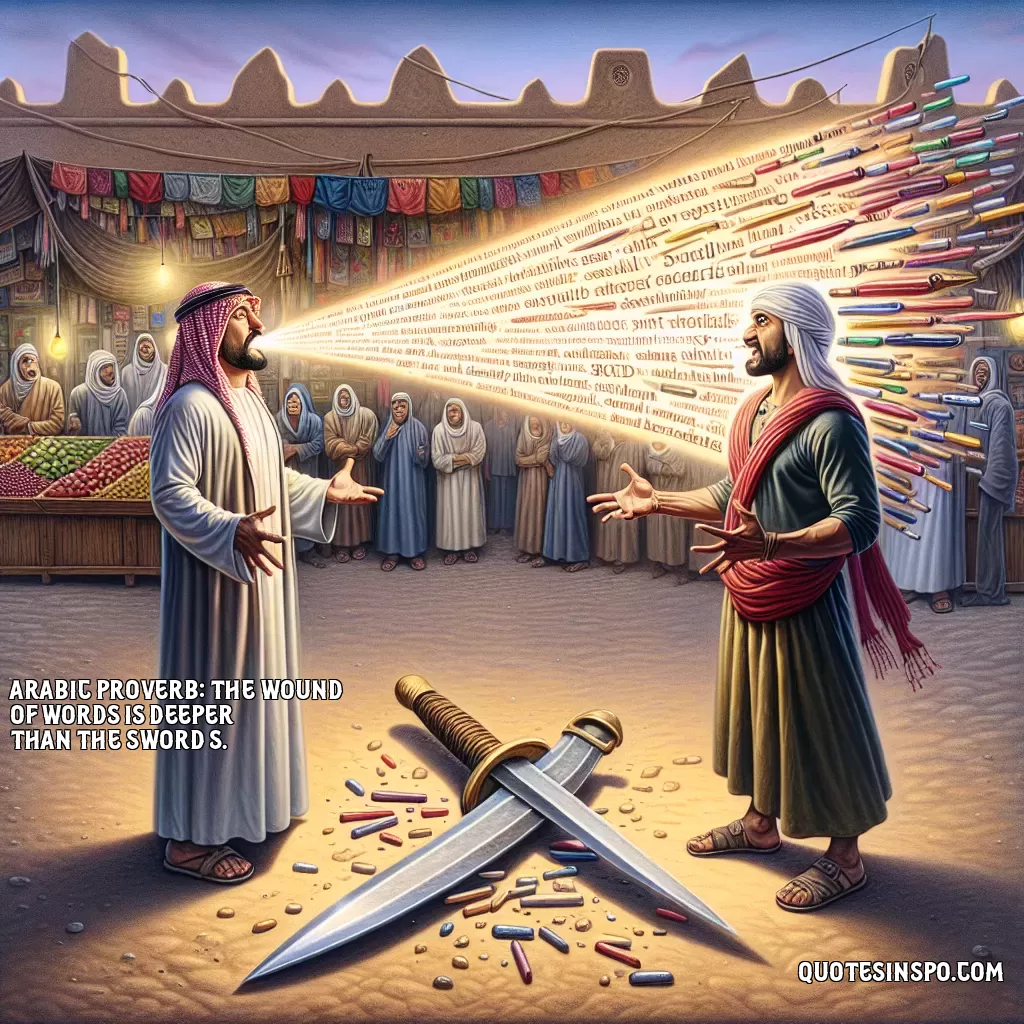
Arabic Proverb: The wound of words is deeper than the sword’s.
The Arabic proverb "The wound of words is deeper than the sword's" highlights the profound impact that words can have on an individual's emotions and psyche, often surpassing the physical harm caused by a weapon like a sword. At its core, this proverb serves as a powerful reminder of the weight and significance of words in human interactions. Unlike physical wounds, which typically heal over time, the wounds inflicted by harsh, cruel, or thoughtless words can linger for much longer, sometimes stretching into a person's psychological and emotional landscape for years, or even a lifetime. Words can pierce a person's self-esteem, alter their self-perception, and influence their behavior in subtle and not-so-subtle ways. They have the power to shape one's identity, as well as their relationships with others. Moreover, words can be deceitful and manipulative, capable of delivering blows that are less visible but more damaging than a physical strike. They can alienate individuals, dismantle relationships, and scar minds with negative memories and impressions. Once spoken, words cannot be taken back, and their effects can be difficult to mitigate or reverse. This proverb underscores the responsibility that accompanies speech, emphasizing the need for sensitivity, care, and compassion in communication. It calls for mindfulness in how we express our thoughts and feelings, urging us to consider the potential impact of our words on others. By recognizing the deep wounds that words can cause, we can strive to use language as a tool for kindness, healing, and building deeper connections rather than harm.
Quote By: Arabic Proverb
### The Rich Tapestry of Arabic Proverbs: Wisdom Through the Ages
Arabic proverbs, or "amthal," serve as a profound reflection of the rich cultural, social, and intellectual heritage of the Arab world. These sayings, often steeped in history, encapsulate the collective wisdom of the Arab people, echoing the experiences and values that have been passed down through generations. As one delves into the intricate world of Arabic proverbs, it becomes clear how they function as a guiding compass for life, relationships, and moral conduct.
The roots of Arabic proverbs can be traced back to the pre-Islamic era, a time when oral tradition held a significant place in societal communication. Renowned for their poetic quality and metaphorical depth, these proverbs served not only as teaching tools but also as vehicles for cultural expression. In Islamic culture, these sayings gained even further prominence as they were often employed by scholars and poets to convey philosophical and ethical lessons. Authors throughout the ages have utilized Arabic proverbs in their literary works, enriching stories and narratives with timeless wisdom.
One of the most striking aspects of Arabic proverbs is their universality. While they reflect specific cultural contexts, many of these sayings resonate with broader human experiences, bridging gaps between diverse societies. For example, the proverb “The pen is mightier than the sword” underscores the value of knowledge and communication, a theme that transcends cultural boundaries. The works of authors like Taha Hussein and Naguib Mahfouz illustrate how deeply embedded these proverbs are in the fabric of Arabic literature, reinforcing moral teachings and cultural identity.
In contemporary times, Arabic proverbs continue to be relevant, as they encapsulate the complexities of modern life while retaining their original wisdom. Authors who explore the significance of these sayings often highlight their role in preserving cultural identity amid globalization. The timelessness of Arabic proverbs makes them invaluable not only as linguistic art but also as essential threads woven into the broader narrative of human experience.
In conclusion, the enduring legacy of Arabic proverbs speaks volumes about the significance of cultural wisdom in shaping identities and guiding behaviors. As readers engage with these colorful sayings, they discover a world where language, culture, and the human experience intersect. Arabic proverbs remain a remarkable testament to the resilience and creativity of a civilization that continues to inspire and educate through its words.